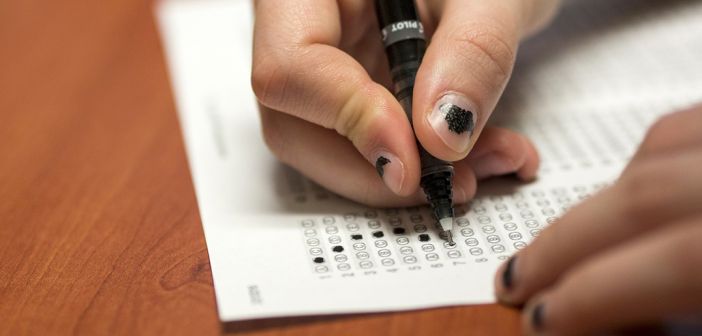Let’s take a little test.
Choose the best answer to the question: What are the consequences of standardized tests?
A. Instruction time is being consumed by monotonous test preparation.
B. The multiple-choice format used on standardized tests is an inadequate assessment tool.
C. Excessive testing may teach children to be good at taking tests, but does not prepare them for productive adult lives.
D. Standardized tests are an imprecise measure of teacher performance, yet they are used to reward and punish teachers.
E. Each state develops its own No Child Left Behind standards and assessments, providing no basis for meaningful comparison.
F. All of the above.
If you chose F, you are right. But instead of leaving you questioning why all of these answers are incorrect on their own, let’s elaborate.
Since the introduction of No Child Left Behind in 2001, standardized tests have become a prevalent way to measure the achievements in public high schools and often measure teacher performance, among other factors. This leads teachers to spend class time “teaching to the test” and emphasizing right and wrong answers as opposed to critical analysis and discussion. Some higher-achieving classes might also have review days before taking the test, which emphasize skills these tests will measure, but puts their class curriculum on hold.
“Teaching for the test” is an ineffective way to learn, because is it truly reflective of the skills you will need in college, or even once you go into the workforce?
We see the effects of “teaching for the test” once we get to Lehigh. The university requires all first-years to take English I and II along with a first-year seminar. These classes foster discussion, critical thinking and analysis and often include a lot of writing. They challenge a student’s notion of being taught for the test, instead focusing on daily discussions and being able to elaborate on thoughts with a written essay.
Additionally, the circumstances of these tests — where you have to remember how to do everything and have little to no tools at your disposal — are not an accurate reflection of real-life problem solving. If you become an engineer, you can ask coworkers for help, have a formula with you or even have pre-existing programs that help you solve these problems. Understanding the theories and formulas behind problems might be helpful, but it needs to be balanced with analysis as to what the numbers you are plugging into this formula do and what they mean.
The standards set by these tests are not even regulated across the country. What is measured in California might not be the same skills measured in Ohio, or in any other state, for that matter. If we were to really standardize education, why would the standard be different within each state?
The problem with standardized tests is precisely this: They want to try to create a basic education for everyone, but they’re failing on a national level.
Not only is each state test different, but they mostly test for math and reading. Although these subjects are important, what about sciences or history? What about arts or writing? These tests benefit the type of students that are good at these subjects, yet there’s so much more students learn in class that isn’t reflected in these tests.
Although this is an educational issue the government is trying to change with the start of the Common Core Standard, it’s a problem that needs widespread changes to truly be effective. Focusing on a more comprehensive way of measuring student success could be a start.
Instead of giving standardized tests a focus on right or wrong answers, there needs to be a more comprehensive and complete way to measure that students are learning and achieving throughout the nation. It should also be done for subjects besides math and reading. This could provide more insight on individual student achievement and help students who have different educational strengths.
Educating a nation’s citizens is important, and that’s why understanding the baseline — or having a baseline — of what students are supposed to learn is, in theory, a good idea. Yet, education is something that can’t truly be standardized. Children all learn in different ways and while one method or teacher may be effective for most — it may not be effective for all the children, or vice versa.
After all, how can you accurately gauge student’s knowledge with a Scantron sheet?
Without these Scantrons or with the inclusion of a more comprehensive test, we may be able to turn the answer to our question from “all of the above” into “none of the above.”






Comment policy
Comments posted to The Brown and White website are reviewed by a moderator before being approved. Incendiary speech or harassing language, including comments targeted at individuals, may be deemed unacceptable and not published. Spam and other soliciting will also be declined.
The Brown and White also reserves the right to not publish entirely anonymous comments.